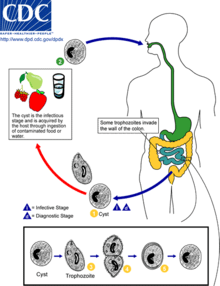Trophozoite
A trophozoite (G. trope, nourishment + zoon, animal) is the activated, feeding stage in the life cycle of certain protozoan parasites such as in the malaria-causing Plasmodium falciparum and those of the Giardia group.[1] (The opposite of the trophozoite state is the thick-walled cyst form).
Life cycle stages

Life cycle of Balantidium coli
Trophozoite and cyst stages are shown in the life cycle of Balantidium coli the causative agent of balantidiasis.
In the apicomplexan life cycle the trophozoite undergoes schizogony (asexual reproduction) and develops into a schizont which contains merozoites.
References
- ↑ Yaeger, Robert G. (1996). "Protozoa: Structure, Classification, Growth, and Development". Medical Microbiology. University of Texas Medical Branch at Galveston.
This article is issued from
Wikipedia.
The text is licensed under Creative Commons - Attribution - Sharealike.
Additional terms may apply for the media files.